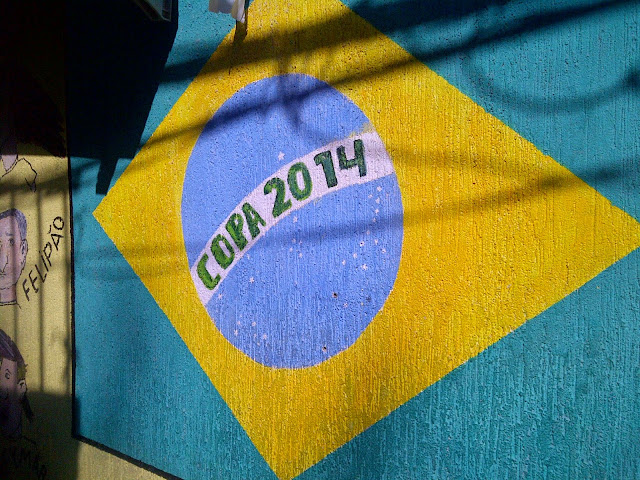February 10, 2015
This was, by far, the most interesting of the Rio tours. From our hotel, a van whisked us away with a small group and our guide Diego (they're a dime a dozen here) provided background on route to the first of two favelas we would visit today. It was another squelcher of a hot day. He started by saying that favelas were like organized chaos, and that pretty much hit the nail on the head.
Not so many years back in 2008, favelas were places you wouldn't dare step foot for fear of being gunned down by thugs amidst drug deals and street crime. This changed somewhat when the state finally began to 'pacify' the communities to bring some law and order. UPP or police pacification units have now grown to 38 employing well in excess of 5,000 under trained 'officers'!
Of course that came with a whole new set of problems as the hierarchy shifted and police actions created a vacuum which was filled by self-styled militias. It is somewhat of a brighter scene these days, though not pretty by a long shot, and the fine folks at the favelas actually protect the tourists for fear of police presence, so we felt safe waking the streets in two different favelas.
Rocinha, the largest in the country is home to between 70,000 to 100,000. Before a 2010 Census it was thought to be more than 150,000. It is mandatory to vote and 'important required papers' are revoked if they do not, as an 'incentive'.
There are 1,000 favelas spread across the city. Houses crammed on top of each other, some underground with access through dark, damp stone walkways. What's a building permit? Residents have electricity, cable TV, clean drinking water, plumbing, and the rooftops are peppered with satellite dishes. Stores, pharmacies, even pet stores are open for business. Local buses cannot weave up the smaller alleys and that's where the motorcycle taxis take over, whipping up and down, passengers in tow. There have been a number of grave accidents. We witnessed a man carrying a full-sized fridge up an incline and another with a juke box strapped to his back in the plus 30 degree temps.
There's a vicious cycle and great loopholes and neglect in schooling and a huge number are functionally illiterate as a result. We were told that a few favella residents also actually hold university degrees and travel outside to work, as do others. We visited a privately founded and funded school, Para Ti (For You), which takes a small number of kids to teach them so that they don't follow in generations of footsteps and hopefully, will go on to break the mold. I'm unsure why the public schools are not doing this, it's so basic.
We grabbed a beer at a street stand and I bought a piece of canvas art from a young guy and I left him with a Canadian flag pin after we chatted about where we were from and he was interested in Canada. Others bought some handmade jewellery. I had also rummaged through my suitcase in Buenos Aires after seeing the street woman with two kids, in the hopes of giving her some clothes I don't really need, but we were told she would be allowed on the mall on weekends only, so brought a few bags and dropped them to two women, one in each favela.
We drove by a major fashion mall and past lush, pristine golf greens to our second stop, Favela da Canoa, which houses 2,500 non tax paying residents who share the street on one side, in stark contrast, with prestigious São Conrado, who pay the highest income and property taxes, on the other.
We stopped at a body shop where a man worked on a car, and went through to the back to a beautifully tiled terrace where we had the best views of Rio. The man working on the vehicle owns the building and rents rooms there. He lives elsewhere. The building itself was a dump.
In Favela da Canoa, we were introduced to a bar owner where we ordered a few caipurinha, a typical alcohol-infused lime drink, and then were led though a partially below-ground alley, grey, dank and smelling like wet rock and dog, with electrical wires dangling here and there (as some 'borrow' electricity), and returned to pick up our now prepared drinks.
We are so fortunate. Others are not. Some are there by their own doing and some are born into it. Either way it's a sad sight.
Part of our trip fee is put toward funding the Para Ti school....1.6 Billion will be spent on the 2016 Olympics in Rio de Janiero, Brazil.

























No comments:
Post a Comment